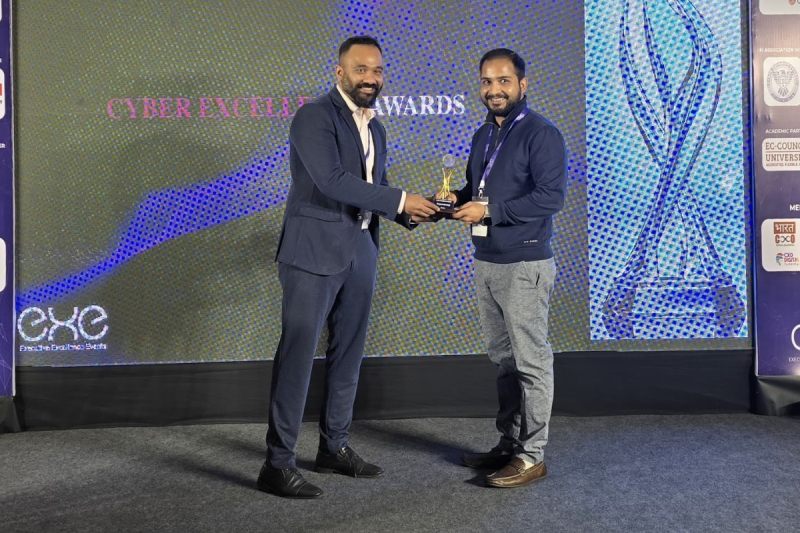Cybersecurity Leader Satyam Rastogi Recognized as Key Stakeholder for Cyber Excellence Award 2025

Satyam Rastogi, a globally recognized cybersecurity expert, has been named a key stakeholder for the prestigious Cyber Excellence Award 2025 at CISO CONNECT 2025 Hyderabad. This recognition is a testament to his outstanding contributions to strengthening cybersecurity practices across enterprises, governments, and the digital ecosystem.
Satyam is currently serving as the Director of Information Security and DevOps at BAMKO, a publicly listed multinational organization. In this role, he has been instrumental in building secure cloud infrastructures, leading compliance programs aligned with ISO 27001, SOC 2, GDPR, PCI DSS, and NIST CSF, and establishing advanced DevSecOps pipelines.
Over the years, Satyam has advised and protected a wide range of entities from global corporations and public sector units to fast-scaling startups. His work has directly contributed to reducing cyber risk exposure, securing critical applications, and aligning IT systems with modern security frameworks.
About Satyam Rastogi: A Leader in Cybersecurity, Compliance, and DevSecOps
Satyam Rastogi is known for his deep technical expertise and strategic leadership in cybersecurity. He has led internal red team operations, threat hunting programs, and incident response strategies across cloud-native environments. His achievements include:
– Delivering security transformation programs for publicly traded companies in North America and India.
– Speaking at leading cybersecurity conferences such as TEISS, DEFCON, OWASPCon, and Cloud Security Alliance forums.
– Driving AI-based automation in vulnerability management, access governance, and compliance reporting.
– Assisting multiple startups and SaaS providers in implementing security-by-design principles.
– Earning certifications including OSCP, CISA, CISM, ISO 27001 Lead Auditor, CEH, PMI RMP and NIST-compliance credentials.
CERT-In Advisory on 16 Billion Credentials Breach: Why Just Changing Passwords is Not Enough
In response to a recent cybersecurity alert, the Indian Computer Emergency Response Team (CERT-In) advised users to change their passwords following the exposure of over 16 billion credentials. This large data dump, compiled from historical breaches and infostealer malware campaigns, highlights the growing risks of credential-based attacks.
Satyam Rastogi responded to this advisory by highlighting a critical security gap:
“If your credentials are part of this breach, merely changing passwords is not enough. We strongly urge all individuals and organizations to enable multi-factor authentication (MFA/2FA) across all critical services. This significantly reduces the risk of unauthorized access, even if your password is compromised.”
He further added that the dark web is flooded with confidential information, including login credentials, session tokens, and corporate secrets. This data is often sold or traded through underground forums and marketplaces, making it essential for users to go beyond reactive steps.
Recommended Actions from Satyam Rastogi
Satyam recommends the following immediate steps for both individuals and enterprises:
– Enable MFA or biometric-based authentication on all critical accounts.
– Use a password manager to generate and store complex, unique passwords.
– Conduct malware scans to detect infostealers on personal and organizational devices.
– Regularly audit and deactivate unused accounts.
– Implement role-based access control (RBAC) and restrict administrative privileges.
Leading the Next Phase of Cyber Resilience
As organizations across India and the globe face evolving cyber threats, leaders like Satyam Rastogi are setting new standards in proactive cybersecurity. Through his role in public and private cybersecurity advisory panels, speaking engagements, and real-world red team operations, Satyam is helping shape a safer and more resilient digital future.
For media inquiries, partnerships, or keynote opportunities, please contact:
Media Contact
Email: press@satyamrastogi.in
Website: https://www.satyamrastogi.in
CERT-In Advisory CIAD-2025-0024: Credential Exposure Across Multiple Online Services
On June 23, 2025, the Indian Computer Emergency Response Team (CERT-In) released an official advisory (CIAD-2025-0024) highlighting a major cybersecurity risk involving approximately 16 billion compromised login credentials. These include usernames, passwords, authentication tokens, and metadata sourced from platforms such as Apple, Google, Facebook, Telegram, GitHub, and several VPN services.
The data was compiled from 30 separate sources via infostealer malware and exposed misconfigured Elasticsearch instances, creating significant risks of credential stuffing, phishing, account takeover, and ransomware.
Data Compromised Includes:
– Username and password combinations from major consumer and enterprise platforms
– Authentication tokens and session cookies
– Metadata linking credentials to user profiles and devices
Risks Identified by CERT-In:
– Credential stuffing across services
– Phishing and targeted social engineering
– Account takeovers and identity theft
– Ransomware and business email compromise (BEC)
Satyam Rastogi Responds to the National Advisory
Cybersecurity leader Satyam Rastogi reinforced that password changes alone are not enough in the face of such widespread exposure. He reiterated the urgency of enforcing robust access control mechanisms, especially for critical accounts:
“If your credentials are part of this breach, merely changing passwords is not enough. We strongly urge all individuals and organizations to enable multi-factor authentication (MFA/2FA) across all critical services. This significantly reduces the risk of unauthorized access, even if your password is compromised.”
CERT-In Recommended Risk Mitigation Actions
For Individuals:
1. Update all passwords immediately using strong, unique combinations (min 12 characters).
2. Enable Multi-Factor Authentication (MFA) wherever possible.
3. Transition to passkeys using supported platforms like Apple or Google.
4. Run antivirus scans to detect and remove infostealer malware.
For Organizations and System Administrators:
1. Enforce zero-trust security with MFA and least-privilege access.
2. Monitor systems using IDS and SIEM tools to detect suspicious activities.
3. Audit data storage and secure credentials with encryption.
4. Conduct employee training on phishing, secure password practices, and breach response.
🔗 Connect with Satyam A. Rastogi